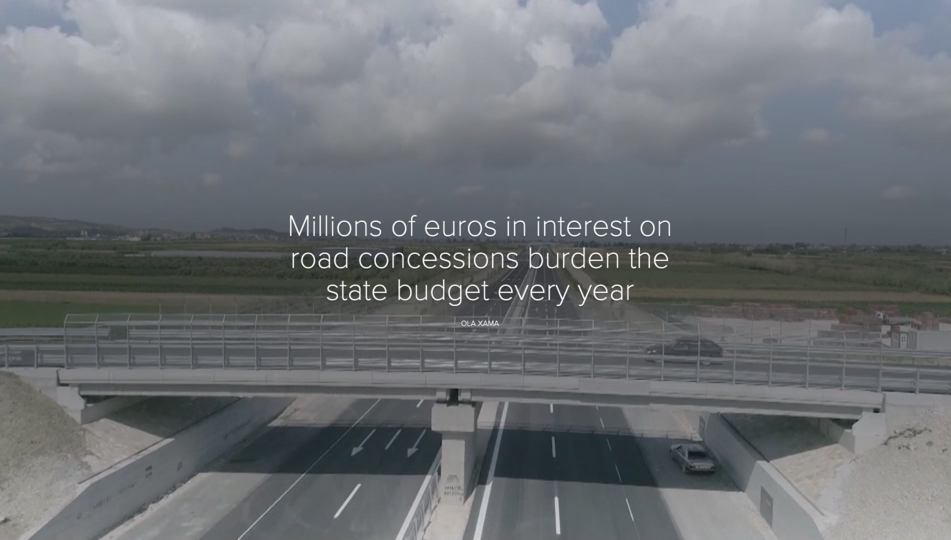To read this article in Albanian click here
Data provided by Investigative Network Albania proves that the Albanian state will pay 110 million euros in interest on the capital that 3 concession companies are investing in road construction contracts, unjustly charging the taxpayers’ budget with high costs. The interest rates secured by private companies on commercial banks are at least twice as high as the interest usually received by the state through debt financing in treasury bond issuance operations.
Author: Ola Xama
“Rruga e Arbrit”, we will pay 40 million euros in interest
In July 2018, a few days after the start of the implementation of the concession contract “For the Improvement, Construction and Maintenance of Rruga e Arbrit”, the company “Gjoka 87”, which is 100% owned by “Gjoka Konstruksion”, signed a loan agreement with the National Commercial Bank for a value of ALL 9.5 billion, with the equivalent value in euro of 77 million.
The loan contract, secured in confidence, proves that the interest, which the bank has applied for this amount, is Treasury bonds + 3.5%, but not lower than 7%.

Rruga e Arbrit resumed construction in mid-2018, after a tender won by the company “Gjoka Konstruksion”, which, in an unsolicited bid submitted to the government, committed to invest 215 million euros of its own funds for the rehabilitation of 25 kilometers and for the construction of another 46 kilometers of new roads, including 6 tunnels and 4 bridges.
However, the documents provided by Investigative Network Albania show that the contract actually burdens the state budget, forcing it to pay 328 million euros at the end, of which 40 million euros are bank interest.
The trick lies in the term “Treasury bills”, which is written in the loan agreement between BKT and the concession company. Referring to this agreement, the loan will be applied with a minimum interest of 7%.
Paradoxically, the effective interest with which the bank lends to the company that will build Rruga e Arbrit is 3.5 percentage points higher than the interest that the government itself borrows through Treasury bill operations.
For economics experts, this maneuver best illustrates the mismanagement of public finances.
“If the state can receive money at a rate as much as half the interest rate that private companies receive, then what is the logic that the government should pay an additional cost? In this way, the government finances both the financial system and the interest rates of this system”, – comments for Investigative Network Albania, the professor of economics, Selami Xhepa.
“It would be more effective for the money to be taken directly from the government and for the construction of the work to be carried out”, – further explains the expert Xhepa.
Referring to the official data of the Auction Register, published by the Bank of Albania, in 2018 the average rates of Treasury bills were at the level of 1.9%, varying to 2.4% in the maximum value and to 1.4% in other auctions, almost 5 times lower than the minimum interest of 7%, which is placed in the loan contract of the firm “Gjoka 87” and the bank.
The interest that the company puts on the state for all the invested capital is 4.5%. Even the debt that the state has taken in foreign markets through the issuance of Eurobond, has never reached this rate.
In the last issue of the Eurobond issue, in November of this year, Albania borrowed 650 million euros with a 10-year term against an interest rate of 3.75%.
The Eurobond was taken at a lower interest rate in 2020, the year in which concession payments were all financed through borrowing, resulting in a very expensive public finance scheme: a debt to pay off debt. So loans from road construction companies and loans in markets to pay concessionaire firms.
Based on the calculations, it turns out that the value that the government will pay at the end of the contract is 328 million euros, while the investment for the construction of the segment is 215 million euros, contradicting the decision of the Council of Ministers “On the Approval of Rules for Evaluation and Concession / Public-Private Partnership Provision of Public Works and Services for Construction, Operation, Maintenance and Rehabilitation of National Roads”, which clearly specifies that the Public Authority chooses the PPP form, if its economic value is lower than that of public procurement of the work with funds from the budget.
For economics experts this is a favoritism scheme that the government is using to support its clients.
“In Albania, public works, despite the fact that they are planned to start with private funds, we see that they receive financial support with funds from the state budget in the second year of construction, which means that “de facto” their financing is done directly from the state budget money”, – says Professor Xhepa.
On the other hand, the Ministry of Infrastructure and Energy responded to the request for information from INA MEDIA that “for financial issues you should contact the Ministry of Finance and Economy, as the institution which has approved the feasibility study for these procedures”, while the Ministry of Finance itself has not responded to a request for information so far.
The administrator of the concession company, “Gjoka 87”, Erind Gjoka, said that “the cost of road construction was lower than the offers given by other companies and lower than the offers in similar contracts”, while he chose not to comment on the bank interest on the loan, which he treated as confidential, trading information of his company with the banks.

High interest also for the Yacht Port – Dukat – Orikum
In the case of lack of funds in the state budget to build public works, the traditional way, chosen by governments, is borrowing.
Albania has a long history of loans from financial institutions, international, such as EBRD, World Bank, CEB, IDB, etc., becoming the most used form of infrastructure financing by previous governments due to soft interest rates.
But, the most used form for public investments by Rama’s cabinet in the last 8 years is that of public-private partnership, resulting “de facto” in the scheme where the state enters into loan agreements with private companies, which charge high interest rates. for the money they invest.
Documents provided by Investigative Network Albania prove that an interest of 5%, which is higher than the interest for the concession of Rruga e Arbrit, is being paid for the construction of the road Yacht Port – Dukat – Orikum.
The company “Gjikuria”, which has won this concession contract, has managed to finance the construction of the road through a loan worth 25.6 million euros, obtained in an agreement with three banks: “Intesa San Paolo”, “OTP” and “Tirana Bank”, against a 6% interest.
The loan agreement states that the money is taken for a 10-year term, where the interest base will be the Treasury bill rate plus 3.5%, but not less than 6%.

Facsimile of the loan contract between the company “Gjikuria” and three banks for the construction of the road Yacht Port – Dukat-Orikum “
To balance the amount of interest that will be paid from the loan taken, the company decided to apply to the state another interest of 5% for 21.7 million euros that it will finance itself in this segment, causing the state to pay 17.2 million euros interest on the contract.
According to the calculations of Investigative Network Albania, if the funds were provided through borrowing in the domestic market with interest rates in March, the state budget would pay 5.6 million euros for interest or 11.6 million euros less.
The damage caused to the state budget by these contracts is not only related to high bank interest rates, but also to their miscalculations by the company, while state officials, both in the Ministry of Infrastructure and Energy and in the Ministry of Finance, have taken them for granted.
The financial model calculated by “Gjikuria”
“The interest requested for the loan in the amount of 25,585,914 euros with a 13-year term and 5% interest results in a total of 9,054,778 euros, with a difference from the interest calculated in the contract of 9,507,452 in the amount of 452,674 euros. So, the effect of overestimation of interest as a result of incorrect calculations is estimated at 452,674 euros. – it is stated in an audit that KLSH has done to this contract.
Arithmetic and logical errors of the contract do not end here. In one case, in the appendix of the “Financial Model”, it is stated that payments from the state for road construction will start in the third year, while in the table explaining the method of payment, the amounts that will be paid by the budget, start in the second year. On the other hand, KLSH has found arithmetic errors in the calculation of the payment of the principal, where the state budget is unfairly charged with 1.2 million euros.
“This is a triple debt, it is an excess, a completely artificial increase of public debt, it is an absurd financing, which is done to the operations of private companies”, – considers the economics expert, Selami Xhepa.
“These types of practices should be the subject of thorough investigations and serious audits by specialized agencies,” he further suggests.
In response to a request for information, the Ministry of Infrastructure and Energy clarifies that so far 21.2% of the works have been completed, while the amount invested by the company is in the amount of 11.6 million euros.
The Ministry of Infrastructure said that the contract has not been changed to correct the errors found by KLSH, adding that payments from the state budget for the contract will start in 2022.
The company “Gjikuria” for its part said that the bank interest was found with the most optimal market conditions, while adding that the public-private partnership enables the state to work, without immediately providing financing.
Regarding the errors found by KLSH, the company “Gjikuria” said that “slips” have been clarified in other pages of the contract, but without creating problems that affect its functioning and implementation.

How costs for road construction doubled
The initial budget, planned by the government for the construction of Rruga e Arbrit, was 200 million euros, but the official documents of the fiscal register of the Ministry of Finance show that the value that the budget will pay for this work has reached 328 million euros, 60% more than the initial accounts.

The bid of the company “Gjoka Konstruksion” for the value of the road investment was 215 million euros, a figure which during the negotiation of the contract reached 273 million euros, where 17 million euros would go for road maintenance for 10 years, while the rest were the interests that the company placed on the state.
The increase in costs in the budget was reflected several months after the start of works, because the contract did not provide for the value of VAT for the project and amounted to 328 million euros.
The company “Gjoka Konstruksion” did not comment on the part of the change of costs in the state budget tables, explaining that the value, which it has proposed, has been the same since the beginning of the offer.
As in the case of the Rruga e Arbrit concession contract, the costs of building the 14.7-kilometer Yacht Port in Orikum to the St. Eliza Bridge in Dukat village have doubled.
In the tender announced in July 2018, the Ministry of Infrastructure and Energy opened bids for companies that would be offered to invest 50.5 million euros for this road, while payments would be made over 13 years from the state budget.
Most of this amount, 47.3 million euros, would go to the construction of the axis and the rest would be allocated for road maintenance and project design.
The tender was announced after an “unsolicited proposal”, submitted by the company “Gjikuria”, which was rewarded with a bonus for participating in the tender.
At the time of concluding the contract, the cost that was expected to be paid at the end of the 13th year, the state budget amounted to 70.1 million euros, due to an interest of 6%, which the entrepreneur calculated for the value of the capital to be invested.
But, after the voices of the opposition denouncing, at the time when the contract was being approved in the parliament, the company was forced to reduce the payments that it would collect to 67.3 million euros.
In the negotiations with the government, the company “Gjikuria” pledges in a letter sent to the Ministry of Infrastructure and Energy to reduce by 270 thousand euros the voice of the “Project Study”, by 135 thousand euros, “Segment Reconstruction” and lead to 5% interest on capital, which would be engaged in this construction, where more than half would be taken through bank loans.
“We declare that this reduction of the value of capital expenditures and the reduction of the interest rate will not affect any of our contractual commitments and will not affect the quality of works,” the letter reads.

This is not the only time the value of this contract has changed. In the accounting of concession payments, made by the Ministry of Finance and Economy, the fund that will be paid by the budget in the last year of the agreement is 82 million euros, adding the value added tax that was not provided in the contract.
Democrat MP of Vlora district, Fatjon Veizaj, compares it with the value that the budget is paying in another axis of the same district, the Vlorë bypass, which will cost taxpayers 35.8 million euros.
“If we make a comparison, the bypass has a length of 29 kilometers, most of it is a new trail and has 6 works of art in the form of bridges, which cost, as they are built on difficult mountainous terrain, while the Orikum – Dukat road is mostly not a new trail and is built on flat ground, but it costs 82 million euros”, – says the deputy Veizaj.
“All these contracts must be subject to control, in order to understand the additional costs that will be paid by the state budget,” he added.
For economics experts, “incomplete contracts” are already a familiar maneuver, hiding the true costs of a work.
“The essential problem even for the theories of economics, which is related to such cases, is the phenomenon of “incomplete contracts”. This has led to a very high degree of deviation between the initial price and the final price, with which a work is realized” – says economics professor, Selami Xhepa.
The government plans to provide other routes on concession
The public appearance of the Minister of Infrastructure and Energy, Belinda Balluku, at the beginning of the Covid-19 pandemic and at the height of isolating the lives of businesses for the cancellation of the concession contract for the construction of 17.3 kilometers from Milot to Balldren, resulted only in words.
In the law “On the Budget of 2022”, the government provides to pay an amount of 10 million ALL for the supervision of works, while payments for the concessionaire are planned to start in 2023.
Although the commitment to start the works for the road was signed 2 and a half years ago, the company has not managed to find financing, violating the essential condition of the contract for finding financing within 12 months.
Despite the non-fulfillment of this obligation, the Ministry of Infrastructure has extended the deadline for the firm ANK, which has justified the delay with the problems caused by the Covid-19 pandemic.
“Due to the pandemic, “Force Majeure” was requested by the company to have a postponement, as it had chosen to negotiate to secure financing with foreign banks and was given time and deadline until December this year to close the financing. “, – said Minister Balluku during a meeting of the Commission of Production Activities, on November 9 2021.
In a request for comment, addressed by Investigative Network Albania, the ministry responded: “We inform that the cancellation of these contracts would be done, if their preconditions were not met. These conditions are met, so the execution of the contract is continuing.”

Even in this contract, the state undertakes to pay 52.1 million euros of interest to the company, where 141.5 million euros are its investment, while at the end of the 13th year of the contract the budget will pour 213.6 million euros without VAT, where, if added and this value, the contract amounts to 257 million euros.
Public finances are also threatened by another bill for launching the implementation of the 21-kilometer road construction project, Thumanë – Fushë Krujë – Vora – Kashar. The decision to cancel this concession by the Ministry of Infrastructure and Energy in January 2019, was challenged in court by the winning tender company, “Gener 2” and on July 29, 2021, the Administrative Court of Appeal decided to repeal the order of cancellation, forcing the ministry to prepare the documentation, for the contract to be approved.
The Thumanë – Kashar road is considered one of the most expensive concessions in infrastructure, as it includes an investment value from the company of 245.7 million euros, while the state will pay at the end of 13 years 442 million euros, including maintenance and interest on the company’s capital. .
The government has started implementing road projects under the name “1 billion-euro investment”, but the construction of 127 kilometers for four concession contracts will burden the budget with a bill of 1.25 billion euros, where at least 250 million euros are interests that will pay the budget for private capital.
The government’s plans to build roads in public-private partnership do not extend to these axes alone. Minister Belinda Balluku herself during the presentation of the 2022 budget stated that there are 3 other projects that will complement the blue corridor junction, which are thought to be realized in partnership with private companies: Murriqan – Milot, Milot – Fier and Fier – Kakavija, but without giving the costs that will be charged to the state budget by these projects.
“PPP road contracts started with the “1 billion-euro investment” project, but their real value today exceeds this amount and currently Albania is the country with the highest level of budget commitments at the level of public-private partnership as nominal value of projects. ”, – concludes Professor Xhepa.




